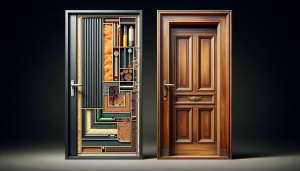Composite vs Wooden Doors
Composite vs Wooden Front Doors: Navigating Your Home’s Perfect Entryway Choice
Table of Contents
The choice between composite and wooden front doors is frequently the most important one to make for your house. Knowing that each has certain benefits and downsides can help you choose the one that best meets the security, longevity, aesthetics, and energy efficiency requirements of your house. This post explores the main differences between wooden and composite doors and offers a thorough analysis.

How do Composite Doors Work?
A variety of materials, including PVC, wood, insulating foam, and GRP (glass reinforced plastic), are used to make composite doors. The limits of single-material doors are intended to be solved by this fusion, which offers improved energy efficiency, security, and durability.
How do Wooden Doors Work?
Conversely, wooden doors are classic and have been around for ages. They are highly valued for their inherent beauty, warmth, and timeless appeal and are usually constructed of solid wood or engineered wood.
Sturdiness and Upkeep
Composite Doors
Distinguished by their strength, these doors can withstand corrosion, warping, and fading. Their upkeep needs are typically modest; all they need is a quick wipedown with a moist cloth to keep them looking nice.
Wooden Doors
Although they have a classic appearance, wooden doors are more weather-resistant. With time, they may rot, twist, or crack—especially if improperly cared for. Painting or varnishing them on a regular basis is necessary to maintain their durability and look.
Safety
Composite Doors
Composite doors are extremely secure due to their sturdy structure and sophisticated locking mechanisms. They provide comfort in terms of home security because they are difficult to breach.
Wooden Doors
Solid wood doors are robust as well, but improper maintenance might jeopardise their security. To meet the security level of composite doors, they could need new locking systems or extra reinforcing.
Energy Effectiveness
Composite Doors
With their exceptional thermal efficiency, insulating foam cores keep your house cool in the summer and warm in the winter. Over time, this may result in energy savings.
Wooden Doors
Wood is an excellent insulator by nature. However, draughts and energy loss may result from a poorly sealed door or from warping.
Style and Personalization
Composite Doors
These doors can resemble wood or have a sleek, contemporary appearance. They come in a variety of colours and finishes. Although they offer architectural flexibility, they might not have the genuine allure of genuine wood.
Wooden Doors
Wooden doors may be fashioned into distinctive shapes and have an unparalleled natural beauty. They provide a timeless and refined appearance that may be altered with various paints and stains.
Price
Composite Doors
Compared to hardwood doors, composite doors often cost more up front. On the other hand, over time, their longevity and low maintenance requirements may prove to be more economical.
Wooden Doors
Depending on the quality of the wood and craftsmanship, wooden doors can cost a lot of money. Even though they could start off cheaper, they eventually require more upkeep, which raises the total cost.
The Environment in Mind
Composite Doors
Composite doors are an ecologically beneficial alternative due to its extended lifespan and frequently recyclable elements
Wooden Doors
Wood is a renewable resource if it is acquired ethically. Their environmental footprint, however, may be impacted by the requirement for routine maintenance and the possibility of replacement. In conclusion, there are benefits and cons to both composite and wooden doors. While composite doors are strong, low-maintenance, and very secure, they might not have the same genuine appeal as wood ones. Although they might be less energy-efficient and require more maintenance, wooden doors have a timeless and exquisite appearance. Whether you like the natural beauty and classic charm of hardwood doors or the maintenance-free lifetime of composite doors, your decision will be based on your priorities. When making your choice, consider the architectural style of your house, your own tastes, and useful features like security and energy efficiency.





